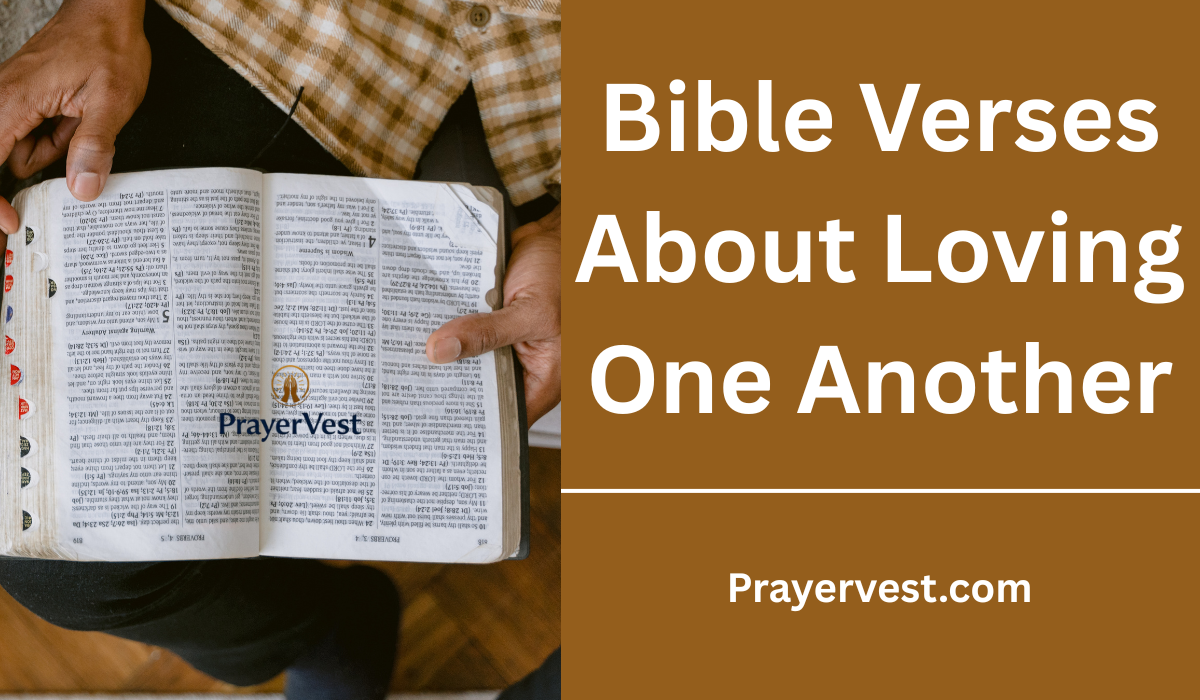At the core of the Christian religion is love. Scripture continuously exhorts believers to love one another in order to mirror God’s nature, from Genesis to Revelation. This divine love is a deliberate, unselfish deed that is based in God’s own nature; it is not just a passing feeling or human attachment.
Jesus demonstrated that love is the best indicator of genuine discipleship when He said that the two greatest commandments are to love God and love our neighbor. Believers reflect the compassion, grace, and mercy of the One who first loved them via love.
Beyond interpersonal relationships, the Bible’s injunction to love one another influences families, communities, and even entire countries. God’s Word calls His people to a higher standard of humility and togetherness in a world that is frequently characterized by pride, division, and self-centered ambition.
Love is persistent, gentle, and patient; it is not constrained by convenience or the desire for its own. Forgiveness, selfless service, and the belief that all people are made in God’s image are all characteristics of true love. This type of love changes people’s hearts and creates a community that is like heaven on earth.


We discover a sacred thread that unites people in divine purpose when we examine Bible verses about loving one another. Every scripture emphasizes love as the realization of God’s law, from Jesus’ teachings in the Gospels to Paul, Peter, and John’s exhortations in the Epistles. These verses serve as a reminder that service without compassion is meaningless, and faith without love is meaningless. Living out the gospel daily means transforming words into actions, compassion into action, and faith into concrete testimony. God’s light shines brightest in a darkened world because of such love.
40 Inspiring Bible Verses About Loving One Another (2026)
1. John 13:34-35
“A new command I give you: Love one another. As I have loved you, so you must love one another. By this everyone will know that you are my disciples, if you love one another.”
Here, Jesus establishes love as the defining mark of His followers. The command is not optional—it is the very foundation of Christian identity. Jesus elevates love from a mere emotion to a divine command that mirrors His own sacrificial affection. Loving others as Christ loved us means embracing patience, forgiveness, and selflessness, even when it costs us something. This verse reminds us that true discipleship is not measured by titles or rituals but by the genuine expression of love toward others.
2. 1 John 4:7-8
“Dear friends, let us love one another, for love comes from God. Everyone who loves has been born of God and knows God. Whoever does not love does not know God, because God is love.”
John reminds believers that love is not just an action but a reflection of divine nature. To love is to reveal the essence of God, for He Himself is love. Those who live in love demonstrate their intimate connection with the Creator, while those who harbor hate or indifference distance themselves from His presence. Love, therefore, is both the fruit and the evidence of our relationship with God.
3. Romans 12:10
“Be devoted to one another in love. Honor one another above yourselves.”
Paul’s exhortation emphasizes humility and mutual respect in relationships. True devotion to others requires seeing them through God’s eyes—worthy of honor and compassion. This verse calls believers to prioritize others’ needs and dignity above personal pride. In a world that often promotes self-interest, such love becomes a radical act of worship that glorifies God through selfless community.
4. 1 Peter 4:8
“Above all, love each other deeply, because love covers over a multitude of sins.”
Peter points to the healing and redemptive power of love. Deep love doesn’t ignore wrongs—it forgives and seeks restoration. This love mirrors Christ’s own mercy, offering grace where judgment might otherwise reign. In relationships strained by conflict, love serves as the bridge that restores unity and brings peace to fractured hearts.
5. Colossians 3:14
“And over all these virtues put on love, which binds them all together in perfect unity.”
Love acts as the glue that unites all Christian virtues—kindness, humility, gentleness, and patience. Without love, even the greatest moral acts lose their spiritual power. Paul teaches that love is not just one virtue among many; it is the crown that completes them all. When love is the foundation, unity and harmony naturally follow.
6. Galatians 5:13-14
“Serve one another humbly in love. For the entire law is fulfilled in keeping this one command: ‘Love your neighbor as yourself.’”
Paul connects love to freedom—true freedom in Christ manifests in service to others. The essence of the law is not found in rigid observance but in loving relationships that reflect God’s heart. Loving others as ourselves dismantles pride and selfish ambition, creating communities rooted in humility and care.
7. Ephesians 4:2-3
“Be completely humble and gentle; be patient, bearing with one another in love. Make every effort to keep the unity of the Spirit through the bond of peace.”
Paul calls believers to embody love through humility, gentleness, and patience. This love is not passive—it requires effort and endurance. Bearing with one another acknowledges human imperfection while choosing grace over resentment. When believers practice such love, they preserve the Spirit’s unity and foster peace within the body of Christ.
8. 1 Thessalonians 3:12
“May the Lord make your love increase and overflow for each other and for everyone else, just as ours does for you.”
Paul prays for love to overflow beyond boundaries, extending not only to fellow believers but to all people. Love is dynamic—it grows, multiplies, and reaches outward when rooted in God. This prayer challenges us to let divine love expand our hearts continually, reflecting the limitless compassion of Christ to everyone we encounter.
9. Proverbs 10:12
“Hatred stirs up conflict, but love covers over all wrongs.”
This ancient wisdom reveals love’s power to bring peace where hatred breeds division. Love is not blind to wrongdoing—it seeks reconciliation rather than revenge. When we respond to offense with love, we disarm bitterness and open the door to healing. Love transforms hostility into harmony and conflict into compassion.
10. 1 Corinthians 13:4-7
“Love is patient, love is kind. It does not envy, it does not boast, it is not proud. It does not dishonor others, it is not self-seeking, it is not easily angered, it keeps no record of wrongs.”
Paul paints a timeless portrait of love’s character. It is not driven by emotion but anchored in virtue—kindness, humility, and perseverance. Love sustains relationships through trials because it reflects God’s steadfast nature. In living out this kind of love, believers embody heaven’s compassion on earth.
11. John 15:12-13
“My command is this: Love each other as I have loved you. Greater love has no one than this: to lay down one’s life for one’s friends.”
Jesus defines the ultimate expression of love—sacrifice. His life and death exemplify selfless devotion, setting the standard for all believers. Loving one another, therefore, is not a matter of convenience but commitment, even to the point of personal cost. True Christian love mirrors the cross: it gives, forgives, and endures.
12. 1 John 3:18
“Dear children, let us not love with words or speech but with actions and in truth.”
John reminds us that genuine love transcends mere words. It is authenticated through deeds and sincerity. Words of love mean little if not accompanied by compassionate action. Real love is active—it feeds the hungry, comforts the sorrowful, and serves without expecting return.
13. Luke 6:31
“Do to others as you would have them do to you.”
Known as the Golden Rule, this verse captures the heart of relational ethics. Jesus challenges His followers to treat others not based on how they are treated, but on how they wish to be treated. This proactive love breaks cycles of resentment and fosters kindness in a world often marked by selfishness.
14. Philippians 2:3-4
“Do nothing out of selfish ambition or vain conceit. Rather, in humility value others above yourselves, not looking to your own interests but each of you to the interests of the others.”
Paul calls believers to cultivate humility as the soil in which love grows. When we prioritize others’ needs over our own, we imitate Christ’s servant heart. True love seeks not advantage but the good of others, nurturing unity and mutual care within the community of faith.
15. Matthew 22:37-39
“‘Love the Lord your God with all your heart and with all your soul and with all your mind.’ This is the first and greatest commandment. And the second is like it: ‘Love your neighbor as yourself.’”
Jesus links love for God and neighbor as inseparable truths. Genuine love for God overflows naturally into compassion for others. The two commandments together form the essence of the Christian life—devotion to God expressed through kindness and service to humanity.
16. Leviticus 19:18
“Do not seek revenge or bear a grudge against anyone among your people, but love your neighbor as yourself. I am the Lord.”
From the Old Testament law emerges the timeless call to love. God commands His people to replace vengeance with mercy and grudges with grace. Loving one’s neighbor as oneself reflects divine justice rooted not in retribution but reconciliation.
17. 1 John 4:11-12
“Dear friends, since God so loved us, we also ought to love one another. No one has ever seen God; but if we love one another, God lives in us and his love is made complete in us.”
John reveals that love makes the invisible God visible. When believers love each other, they become vessels through which divine presence shines. Each act of kindness and forgiveness demonstrates God’s indwelling nature to the world.
18. Hebrews 10:24
“And let us consider how we may spur one another on toward love and good deeds.”
This verse calls believers to actively inspire love and service in others. Faith is not solitary—it thrives in community. Encouraging one another toward compassion and action strengthens the Church and amplifies its witness in the world.
19. James 2:8
“If you really keep the royal law found in Scripture, ‘Love your neighbor as yourself,’ you are doing right.”
James names love as the “royal law,” highlighting its supreme importance in God’s kingdom. Obedience to this command fulfills the essence of all moral duty. Love levels social barriers and honors the divine image in every person.
20. Romans 13:8
“Let no debt remain outstanding, except the continuing debt to love one another, for whoever loves others has fulfilled the law.”
Paul teaches that love is an everlasting obligation—it is never fully paid. Unlike financial debts, love renews daily and grows deeper with each act of grace. This continual love fulfills God’s moral law and sustains relationships in peace.
21. John 15:17
“This is my command: Love each other.”
In simple but profound words, Jesus reiterates His command to love. The repetition emphasizes its divine urgency. To love one another is not a suggestion but a spiritual mandate that identifies believers as members of His kingdom.
22. 1 John 3:16
“This is how we know what love is: Jesus Christ laid down his life for us. And we ought to lay down our lives for our brothers and sisters.”
John defines love through the lens of Christ’s sacrifice. True love is not self-serving but self-giving, willing to endure loss for the sake of others. The cross remains the eternal standard of how believers are to love each other.
23. 1 Peter 1:22
“Now that you have purified yourselves by obeying the truth so that you have sincere love for each other, love one another deeply, from the heart.”
Peter emphasizes purity of heart as the foundation for genuine love. Sincere affection arises from a spirit refined by truth. Such love is not superficial but heartfelt, springing from divine transformation within the believer.
24. 1 Corinthians 16:14
“Do everything in love.”
This short but comprehensive command calls believers to let love permeate every action, decision, and word. When love governs our motives, all we do becomes an act of worship and witness to God’s character.
25. Ephesians 5:2
“Walk in the way of love, just as Christ loved us and gave himself up for us as a fragrant offering and sacrifice to God.”
Paul likens love to a lifestyle—a continual journey modeled after Christ’s self-sacrifice. Living in love means making daily choices to give, serve, and forgive. Such love rises before God as a pleasing spiritual fragrance.
26. 1 Thessalonians 4:9
“Now about your love for one another we do not need to write to you, for you yourselves have been taught by God to love each other.”
Paul acknowledges that the ability to love comes directly from divine instruction. God Himself engraves love upon the hearts of believers, guiding them to express His compassion naturally and sincerely.
27. Matthew 5:44
“But I tell you, love your enemies and pray for those who persecute you.”
Jesus elevates love to its highest expression—loving those who oppose us. This radical love transcends human instinct and reflects divine mercy. By praying for enemies, believers embody God’s redemptive heart in a hostile world.
28. Proverbs 17:17
“A friend loves at all times, and a brother is born for a time of adversity.”
This proverb celebrates the constancy of love. True friendship is steadfast, remaining faithful through joy and hardship alike. Such enduring love mirrors God’s unwavering loyalty toward His people.
29. Galatians 6:2
“Carry each other’s burdens, and in this way you will fulfill the law of Christ.”
Paul connects love with empathy and shared struggle. To bear one another’s burdens is to participate in the compassionate heart of Christ. This mutual support weaves the fabric of community and fulfills God’s command to love.
30. 1 John 2:10
“Anyone who loves their brother and sister lives in the light, and there is nothing in them to make them stumble.”
Love and light are inseparable. When believers love one another, they walk in spiritual clarity, free from the darkness of hatred or envy. Love illuminates the path of righteousness and guards the heart from sin.
31. Romans 15:1-2
“We who are strong ought to bear with the failings of the weak and not to please ourselves. Each of us should please our neighbors for their good, to build them up.”
Paul calls for love that is mature, patient, and constructive. True strength is not about dominance or superiority but about using one’s stability to support those who struggle. This kind of love reflects Christ’s compassion—it bears others’ weaknesses and seeks their growth, not our gratification. Love that builds others up becomes the spiritual foundation of community and discipleship, creating a culture of encouragement rather than criticism.
32. 1 John 4:20-21
“Whoever claims to love God yet hates a brother or sister is a liar. For whoever does not love their brother and sister, whom they have seen, cannot love God, whom they have not seen.”
John’s words are deeply challenging—our love for God is proven by our love for others. Genuine spirituality cannot exist alongside hatred or prejudice. Love for others serves as visible evidence of our invisible faith. The closer we draw to God, the more our hearts are softened toward people, even those who have wronged us. This verse calls believers to integrity in love, ensuring that faith and affection walk hand in hand.
33. 1 John 3:11
“For this is the message you heard from the beginning: We should love one another.”
John reminds us that love is not a new concept—it has always been the heartbeat of God’s message. From creation to Christ, God’s call to humanity has been consistent: to love as He loves. This verse invites believers back to the simplicity and power of the Gospel, urging them to live out love as their primary testimony in a divided world. Love is not secondary to faith; it is the very expression of it.
34. Luke 10:27
“He answered, ‘Love the Lord your God with all your heart and with all your soul and with all your strength and with all your mind,’ and, ‘Love your neighbor as yourself.’”
Jesus affirms that love for God and neighbor encompasses the entire moral law. Loving God fully requires total devotion—emotionally, spiritually, and intellectually—while loving others authentically reflects that devotion outward. This holistic love binds heaven and earth together; it transforms worship into service and belief into compassionate action.
35. Ephesians 4:15-16
“Instead, speaking the truth in love, we will grow to become in every respect the mature body of him who is the head, that is, Christ.”
Paul highlights the delicate balance between truth and love. Both are essential—truth without love can wound, and love without truth can weaken. When spoken with grace, truth nurtures growth and unity within the body of Christ. This verse teaches that loving one another also means guiding each other toward maturity, rooted in Christ’s character.
36. John 3:16
“For God so loved the world that he gave his one and only Son, that whoever believes in him shall not perish but have eternal life.”
This verse reveals the ultimate source and model of love—God Himself. His love is sacrificial, inclusive, and redemptive. By giving His Son, God demonstrated that love is an action that gives, not merely a feeling that fades. This divine example challenges believers to mirror God’s generosity by loving without limit or condition, extending grace to all as He has done for us.
37. 1 Timothy 1:5
“The goal of this command is love, which comes from a pure heart and a good conscience and a sincere faith.”
Paul identifies love as the ultimate purpose of God’s instruction. Doctrine, faith, and obedience all point toward the cultivation of love rooted in purity and sincerity. True love cannot be manufactured—it flows naturally from a heart transformed by God’s truth. This verse reminds us that all spiritual growth must lead to greater love, or it misses the heart of the Gospel.
38. Colossians 2:2
“My goal is that they may be encouraged in heart and united in love, so that they may have the full riches of complete understanding.”
Paul reveals that love and unity are gateways to spiritual insight. When believers are joined in love, their hearts become open to deeper revelation and wisdom from God. Division clouds discernment, but love clears the way for truth. A united, loving community becomes fertile ground for divine understanding and collective strength.
39. Zechariah 7:9-10
“This is what the Lord Almighty said: ‘Administer true justice; show mercy and compassion to one another. Do not oppress the widow or the fatherless, the foreigner or the poor.’”
Through the prophet Zechariah, God ties love directly to justice and mercy. Genuine love manifests in tangible compassion, especially toward the vulnerable and marginalized. To love one another is to advocate for fairness, defend the oppressed, and act with empathy. Love that mirrors God’s heart always includes mercy in motion—it seeks justice through kindness.
40. 1 Corinthians 13:13
“And now these three remain: faith, hope and love. But the greatest of these is love.”
Paul concludes his discourse on spiritual gifts by crowning love as the highest virtue. Faith anchors us, hope sustains us, but love defines us. It transcends time, gifts, and achievements. Love is the language of eternity—the enduring force that binds humanity to God and to one another. When all else fades, love remains, echoing the everlasting heart of God.
Conclusion
The entire gospel message is based on the principle of love. We become living examples of God’s divine character when we decide to love one another as He commands. Every act of compassion, forgiveness, and love shows that the Spirit of God is at work inside us. The words on loving one another serve as a reminder that love is a daily decision to put the needs, desires, and worth of others before our own. In a world that sorely needs hope, love restores connections, heals hearts, and intensifies the light of Christ.
In the end, loving one another satisfies Christ’s fundamental law. It demonstrates the transformative power of God’s grace, strengthens communities, and crosses divides. We become tools of peace and harmony when we let His love direct our words and deeds. May all believers be encouraged by these verses to live in love, not only for those who are easy to love but also for those who present us with challenges. By doing this, we demonstrate to the world that God’s love is genuine, strong, and unending while also embodying the core of true discipleship.





